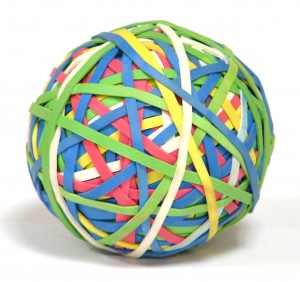“Tomorrow is a new day; begin it well and serenely and with too high a spirit to be encumbered with your old nonsense.”
~ Ralph Waldo Emerson
 There is power in the ability to take action and make a choice. Our brains like the sense of autonomy and control, after all, we want to feel comfortable in our environment. However, this human desire for autonomy and control can be expressed in a variety of ways, some of which may lead to more tension and longer conflicts.
There is power in the ability to take action and make a choice. Our brains like the sense of autonomy and control, after all, we want to feel comfortable in our environment. However, this human desire for autonomy and control can be expressed in a variety of ways, some of which may lead to more tension and longer conflicts.
In two recent discussion threads at The Conflict Coaching Guild on LinkedIn, we pondered the topics of resilience and revenge. Being resilient means being able to bounce back from life’s challenges, learn from different experiences, maintain a positive outlook despite setbacks and disappointments. Resilience requires a proactive, positive attitude and energy. It is hard to be resilient if your health is poor or you are depressed. Resilience is empowering. But so is revenge.
It can feel good to fight back when we are attacked even when we know that the revenge may cause more escalation. It turns out that our reactions to the punishment of bad social behavior range from reduced sympathy towards perpetrators to pleasure. The Prisoner’s Dilemma experiments show that even though the subjects are able to empathize and feel the pain of others, the activity in the pain-related areas of the brain slightly decreases when the participants feel the other side deserved a punishment. Moreover, when men (but not women) in the study watched a defector get punished, they showed additional activation in the pleasure circuit of the brain. Retaliating may feel so sweet because of the added sense of control we derive from our own actions.
The biological impulse to retaliate is strong. Conflicting parties are likely to be stuck in the continuous cycle of violence and revenge unless they find alternative ways to express their autonomy and choice of action. In essence, one side feels autonomous and fulfilled by punishing the other side, and vice versa. Remove the crutch of revenge, and the parties may feel lost and helpless. The challenge is to move beyond our biology and channel the need for autonomy into creative action and true resilience. Here are the choices:
| Revenge | Resilience |
| Blaming | Sharing responsibility |
| Defending | Acknowledging |
| Attacking | Forgiving |
| Stonewalling | Connecting |
| Threatening | Harmonizing |
| Resisting | Accepting |
| Listening selectively | Listening reflectively |
| Ignoring | Inquiring |
| Withholding | Sharing |
| Assuming | Clarifying |
| Catastrophizing | Reframing |
| Reacting | Anticipating |
| Judging | Witnessing |
| Victimizing | Empowering |
When we let go of revenge and embrace our own resilience, we regain the inner source of power. We no longer need an adversary to validate our significance. Instead, we begin relying on our own strengths to carry us forward.

Fascinating post… i was familiar with The Prisoner’s Dilemma and your further insights are most helpful. Thank you